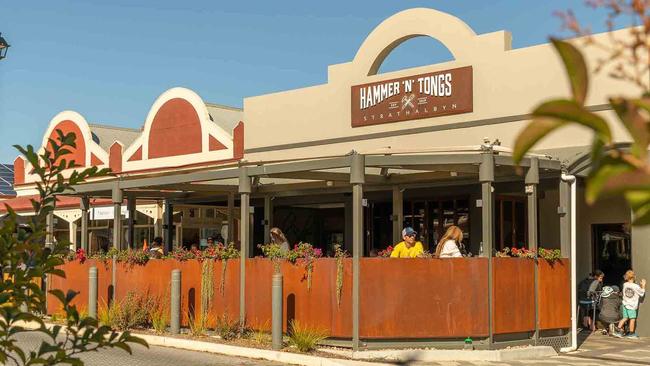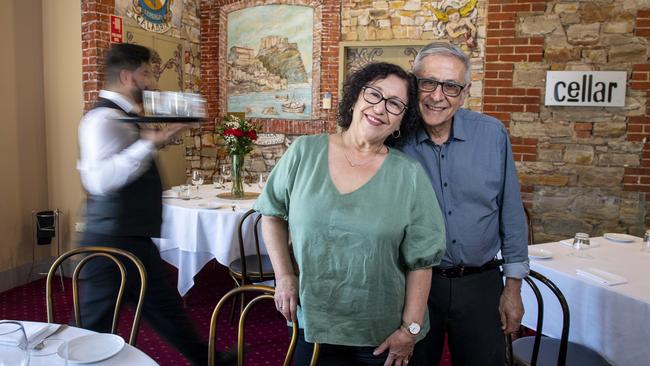Adelaide liquidators say worse is yet to come as cafes and restaurants close down
As thousands of SA cafes, pubs and restaurants struggle with survival, experts say one industry in particular is starting to falter.
SA News
Don't miss out on the headlines from SA News. Followed categories will be added to My News.
The financial future of SA’s hospitality scene is “total s**t”, and worse is yet to come, according to the financial experts who come in to clean up after businesses go bust.
You can’t just blame Covid – the ATO is out to claw back its debts and people are savagely cutting their spending. And other experts say transport and construction are next to go.
A run of SA cafes, restaurants and pubs have closed or gone into administration so far in 2024, with others speaking publicly about their fight for survival and how hard it is to stay afloat.
A drop in spending, people continuing to work from home, interest rate hikes and inflation are all behind the rush of closures.
It ranges from institutions such as Jetty Rd restaurant Cardone’s or Enzo Ristorante, through to cafes and clubs and bakeries.
Accountant Tarquin Koch said he was talking to “plenty” of people in the hospitality industry, including a big operator with three large venues.
He’s overseeing the liquidation of a city cafe that which never recovered because of CBD workers not returning to the office.
“(They) had a big drop in revenue, rent and energy costs went up and it was no longer viable,” he said.
Stuart Otway of SV Partners called the hospitality scene in SA “totally s**t” and said CBD cafes had never “bounced back” because of WFH – but suburban eateries were different.
“Suburban ones didn’t do too badly until rates began to rise,” he said.
“Just when things were supposedly getting better, what happens to the rates? They go up and people’s spending goes down.
“That’s where it starts – you don’t buy a coffee, or buy a coffee but not a muffin, so your turnover decreases but your rent stays the same.
“Rates went up, discretionary spending went down, your turnover decreases.”
Mr Otway said one huge problem for hospitality businesses was being locked into extended leases.
“People sign up for a 10-year lease, but want to get out in three years when they realise the business sucks, so they have to find a way to sell,” he said.
“Pub leases are even longer – I’ve seen one that was 20 years. How are you supposed to get out of that?”

How the ATO – and debt – is partly to blame
It’s not solely due to rising rates and a drop in spending. The ATO is out to get its cash.
“People are saying, I was breaking even as it was and I was hoping to get better – now the ATO is chasing me for a historic debt I accrued years ago, and I can’t do it any more more,” Mr Otway said.
Mr Koch said the ATO was using “all avenues available” to reclaim the $60bn it is owed by small and medium businesses across Australia, he said.
“The ATO are now debt driven, they are less considerate of Covid in terms of how it affected businesses,” he said.
“Covid happened, it was a blip, and they will now pay less attention to people using the C word as to why they’re in trouble. It was too easy to do that. The real reason is, their business wasn’t viable.
“There’s been a lot of sympathy given to people using the C word up to past six months.
“But from six months to now – and going forward – I don’t think that empathy is going to be there from those collecting debts.”
Mr Koch said it wasn’t just hospitality in trouble in SA – transport and freight was next.
“I am dealing with a number of medium-sized transport companies that will go under at some point this year,” he said.
“Just this week I’ve had two transport operators contact me.”
Fuel costs and debt recovery from finance providers were the big two reasons, he said.
“Most people have their assets financed, and I’m seeing them tighten the reins – you used to be able to slip behind a couple of months – not any more.”
Mr Otway, however, said construction inquiries were rising.
“The rumour and inquiries of the past month are more construction-based and less hospitality,” he said.
“Most of my inquiries were CBD restaurants – but the Fringe and Festival are on and they’re hoping things would get better. But people in construction, they’re coming back from the Christmas break and thinking, they've finished their projects and don't have anything to do.”

The impact of the big post-Covid cash spend
James McPherson, managing director of Meertens, said inflation had spiked because after Covid, businesses raised their prices.
He said Covid handouts helped cafes and restaurants survive because of their high employee numbers.
“Then Covid finished and we saw six months of boom, where restrictions were off and everyone couldn’t wait to get back and eat out and they did all very well,” he said.
“And this got them through to 2023, and we had annus horribilis.”
Foot traffic dried up and customers have simply cut their spending over the past 18 months.
“The money’s not there,” he said. “When we came out of Covid, so many businesses raised their prices and a lot of heavy profit is inflation driven, but wages haven’t kept up. Say inflation across the board went up 10 per sent, wages may have increased by 4 per cent. So much has gone up – the cost of butter, milk, petrol, utilities. That translates into less dollars, less disposable income.”

So how do we fix things? What can be done?
Mr Otway said small business need an advocacy service for dealing with landlords
“You’ve got small cafes trying to negotiate with the big boys, they get screwed over and you get signed up for as long they can possibly get.
“You need someone to guide them through that process, through their business planning.
Mr Koch said perceptions needed to change.
“There’s a misconception that things should be cheaper. You don’t have schnitzels for $15 now, it’s $32. It’s just what it costs.”
He also highlighted the astronomical cost of public holiday rates.
“Some of the staff working on Monday are on crazy rates. They’re creaming it in.”
But is it a crisis? Or is it situation normal?
However, Chris Powell, partner at Duncan Powell said he wasn’t convinced hospitality was any worse now that in the past.
“It’s always been a sector that’s had significant failures,” he said. “There are relatively low barriers to entry and for every successful operation, there’s a failure.”
He’s had an increase in inquiries from struggling businesses “across the board”, with construction particularly a problem.
“We’re dealing with the fallout of the Qattro matter, that was a classic example where contracts were written a year or two before and the prices and supply chain issues in that area were diabolic
“So if you’re locked into a price as a builder, you start to see significant losses on that contract. Construction and transport is alway an area for difficulty.”
Tony Matthews said SA had been quieter than in the eastern states where there’s been an increase in insolvencies, but “history” showed collapses tended to flow to SA months later.
“It tends to happen on the east coast then flow across six to eight months later to SA, but not in the same numbers. But it does eventually get here. I do expect an uplift, and construction is at risk.”
State Small Business Minister Andrea Michaels conceded it had been a “challenging” past few years for hospitality.
She said the state government’s $14m small-business strategy, launched last year, contained 20 practical initiatives and programs to support small businesses to grow and succeed.
“It includes our fundamentals program designed to assist small business owners to strengthen their capability across a range of areas core to running a profitable business including financial management, strategic planning and marketing,” she said.
More Coverage
Originally published as Adelaide liquidators say worse is yet to come as cafes and restaurants close down





